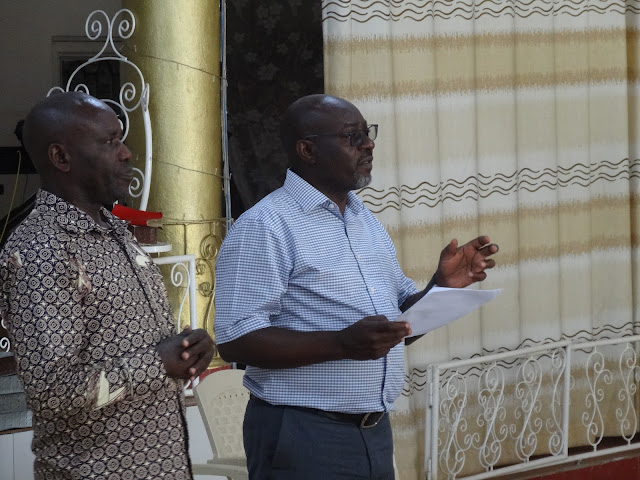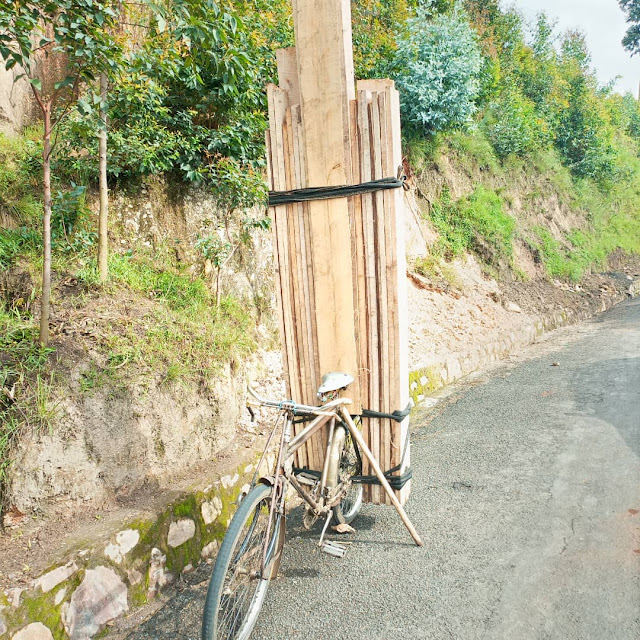By Anthony:
In February I had the privilege of traveling to Burundi to introduce Timothy Leadership Training to many different denominations together. Resonate will be starting a new TLT group there primarily led by my colleagues Stephen from Uganda and Kaka from Kenya. I am grateful for your prayers about this trip. It had really been stressing me out because I was worried one of the three of us would test positive for omicron and then we would either miss our flight going to Burundi, or else we would test positive in Burundi and be stuck there for two weeks. We are thankful to the Lord that we tested negative and accomplished what we set out to do. Our nostrils were hurting though. Each of us had to get four tests over the course of the trip. One time I think they were trying to dig a chunk out of my brain! Here is a photo of Stephen and Kaka. It was the first time the three of us had been together in person.
The church leaders in Burundi were able to taste TLT and now they are hungry for our team to come back to start the trainings. The first group will have 50 church leaders. We had to limit the number to make sure people can really participate in the discussions. But after these 50 leaders graduate, they themselves should be able to spread TLT throughout their country. Half of the participants are from the capital Bujumbura but half are from selected areas around the country. The trainings for this first group will take place every 3-4 months for a couple years. Here are photos from the one-day TLT introduction to the group of 50. This is Kaka speaking on the right.
We also had time to make some visits around the country to meet pastors and get a sense of Burundi. Most importantly, we had one full day to discuss with a planning team - the heads of five denominations - to plan all the details, dates, logistics, and budget for the bigger TLT group.
I learned that Burundi is the poorest country in the world, at least in terms of GDP. But really it didn't seem to be desperately poor, neither in the capital city, nor in the rural areas we visited. It really didn't seem that much different from Uganda both economically and in terms of culture. The biggest difference was language. We were lost in a country that didn't have many English or Swahili speakers! Mostly people speak Kirundi and some French. Ordering from restaurant menus was largely just a guessing game. Another difference is that most of Burundi is very hilly compared to most of Uganda.
Driving is on the right side in Burundi, but on the left in Uganda and Kenya. This threw us off quite a bit, especially since the vehicles are of both types in Burundi, right side steering wheel and left side steering wheel.
Burundi has a long history of violence and instability, much like Uganda. But it is peaceful at the moment and we were very safe the whole trip. Our host, Pastor Masabo, who is from the Baptist Union of Churches, said that all of the Baptist pastors were killed off in the 1970s, so they have had to really focus on training new pastors.
On a three hour drive to a distant area to visit a theological school, we had to drive up and down many hills. Apparently the people with bicycles get really tired riding up the steep hills, especially the bicycles with heavy cargo. So they hitch rides on trucks by grabbing on the back. This is obviously exceedingly dangerous, and it's annoying for the truck drivers since it adds risk and extra weight. Because of this, the truck drivers fasten lots of thorns to the backs of their trucks so that the bicyclists won't be able to grab hold as easily. Many of the bicyclists sit sideways so they can be ready to jump and bail quickly if necessary.
Driving there was terrifying. I had to sit in the back seat, and try to only look out the sides, because it constantly felt like we were about to hit people. And I'm used to driving in Kampala, so you know it must have been really bad for me to feel that way.
Accidents do happen of course, all the time, in Burundi and in Uganda. How could they not on such roads? On our way back from visiting the distant school, we got caught in a traffic jam caused by an accident where two lorries collided. We took advantage of the situation by getting out to walk. We walked 1-2 kilometers through the jam until we found the accident, and then we joined all the people gawking at the scene. This was a highway through the hills, full of switchbacks, and absolutely no alternative side roads. The young boys of the community were inventing ways for vehicles to pass the lorries on the sides of the narrow road, and then extorting money from the people wanting to use those routes. The police stood around doing basically nothing, though finally they put a stop to the passage the young boys had made, thus making the jam even worse so that no vehicles could pass through at all. In the end, the police made a way for an armored bank car to get through that was carrying money and escorted by many police vehicles. Our driver managed to get behind them and so we were able to get home.
But we had been seriously considering trying to find motorcycles to take us back the 1-2 hour drive back to town. I would be shocked if some people didn't spend the night on that road in their vehicles. It was a horrible jam. The jam was made worse because drivers get impatient and instead of waiting in their lane, they try to pass the other people stopped in their lane. They end up blocking the entire road so that the oncoming traffic cannot get through either. It can become an unwinnable jigsaw puzzle to sort out such situations when jams get really bad. I experienced that once when driving in Kampala when everyone tried to go through the intersection at once, and vehicles piled up coming from every direction. We had to wait an hour for a police officer to slowly untangle all the vehicles.
We took a quick trip down to the beach to see Lake Tanganyika.
We ate like kings at both the hotel and at homes, enjoying the hospitality of our Burundian friends:
I even bought us ice cream one night. It was hard for Stephen to eat it. He viewed it as something only children eat! But we are training him slowly slowly.
When we finally reached Uganda, we still had a most of a day long bus ride back to Soroti. Unfortunately we had to endure blaringly loud American 80's music on the television with a Ugandan DJ singing along off key over top of the original singers. It was hard after five minutes, but after several hours straight, well you can only try to imagine.
I'd like to end this post with a message for the Christian Reformed Church. Many of the Reformed denominations in Burundi had been waiting to start TLT for years, and they were so grateful we finally came. Some of the leaders are familiar with the CRC and have even visited our Synod. Here I am with just the leaders of the Reformed denominations (don't associate the names with similar North American denominations) - Protestant Reformed Church of Burundi, Evangelical Reformed Church of Burundi, Christian Reformed Church of Burundi, Reformed Church of East Africa.
These Reformed denominations were grateful to come together for the training and hope to work together more closely with each other. They are all very small denominations in Burundi so someday maybe they will merge into one. They talked about it just briefly.
They say to you that they wanted you to know you have Reformed brothers and sisters existing in Burundi even if they are small. They greet you. They say "please pray for us." "May God help us to achieve our desire to come together and be more strengthened and unified." And they say to "come visit us to train our leaders and enjoy the hospitality of the Burundian people!"























